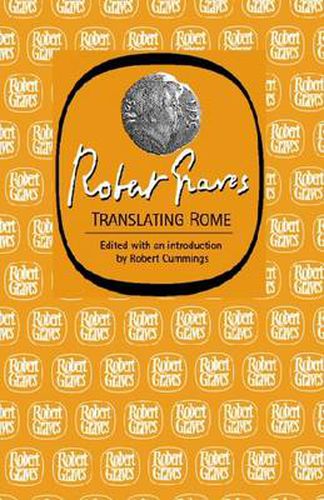Readings Newsletter
Become a Readings Member to make your shopping experience even easier.
Sign in or sign up for free!
You’re not far away from qualifying for FREE standard shipping within Australia
You’ve qualified for FREE standard shipping within Australia
The cart is loading…






In his translations of three major works from the Roman world, brought together in one volume for the first time, Robert Graves brings the myths, legends and history of the classical world vividly to life. His translations influenced a generation of readers, and writers, when they were first published in the 1950s. As Robert Cummings discusses in his introduction, Graves may sometimes override the strict demands of accuracy; his interpretations of, and responses to, his material may at times be idiosyncratic, but ‘Whatever complaints are lodged against Graves’ translations, he remains, after fifty years, eminently readable.‘ Graves himself recognised the translator’s problem: 'how much is owed to the letter, and how much to the spirit’. It is the novelist’s narrative virtuosity, his flair for catching a character’s individual voice, and, above all, his endless curiosity about the world, that make these translations as memorably entertaining as they were to their original audience, as well as a revealing mirror to Graves’ interest in myth in The White Goddess and his imaginative recreations of the classical world in I, Claudius and Claudius the God . The Golden Ass is one of the essential works in European literature, a magical, entertaining, sometimes bawdy, adventure, to which Graves responds with exuberant delight. In contrast, Lucan’s Pharsalia an account of the civil war between Julius Casear and Pompey, raises for Graves issues of the writer’s moral responsibility, the rejection of rhetoric, that in his own time, he writes, had sent poets ‘marching through the Waste Land’ after the Great War. The Twelve Caesars exemplifies the writer’s responsibility to the truthful record in its vivid accounts of the corruptions of arbitrary power.
$9.00 standard shipping within Australia
FREE standard shipping within Australia for orders over $100.00
Express & International shipping calculated at checkout
In his translations of three major works from the Roman world, brought together in one volume for the first time, Robert Graves brings the myths, legends and history of the classical world vividly to life. His translations influenced a generation of readers, and writers, when they were first published in the 1950s. As Robert Cummings discusses in his introduction, Graves may sometimes override the strict demands of accuracy; his interpretations of, and responses to, his material may at times be idiosyncratic, but ‘Whatever complaints are lodged against Graves’ translations, he remains, after fifty years, eminently readable.‘ Graves himself recognised the translator’s problem: 'how much is owed to the letter, and how much to the spirit’. It is the novelist’s narrative virtuosity, his flair for catching a character’s individual voice, and, above all, his endless curiosity about the world, that make these translations as memorably entertaining as they were to their original audience, as well as a revealing mirror to Graves’ interest in myth in The White Goddess and his imaginative recreations of the classical world in I, Claudius and Claudius the God . The Golden Ass is one of the essential works in European literature, a magical, entertaining, sometimes bawdy, adventure, to which Graves responds with exuberant delight. In contrast, Lucan’s Pharsalia an account of the civil war between Julius Casear and Pompey, raises for Graves issues of the writer’s moral responsibility, the rejection of rhetoric, that in his own time, he writes, had sent poets ‘marching through the Waste Land’ after the Great War. The Twelve Caesars exemplifies the writer’s responsibility to the truthful record in its vivid accounts of the corruptions of arbitrary power.